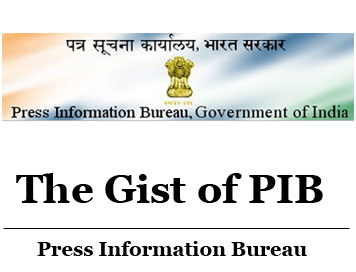
The Gist of Press Information Bureau: March 2016
NSCN (K) as terrorist organization under UAPA
The Government has declared the National Socialist Council of
Nagaland (Khaplang), NSCN (K), all its formations and front organizations as a
terrorist organization under the Unlawful Activities (Prevention) Act, 1967. A
Gazette Notification issued on November 6, 2015 mentions that the NSCN (K), a
militant outfit, came into existence in 1988 and is active along the
Indo-Myanmar border. NSCN (K) has resorted to terrorism by killing innocent
civilians and security forces and engaged in other violent activities including
the June 4, 2015 attack on the Army convoy in Chandel district of Manipur.
Qaumi Ekta Week
With a view to foster and reinforce the spirit of Communal
Harmony, National Integration and pride in vibrant, composite culture and
nationhood, the “Qaumi Ekta Week” (National Integration Week) was observed all
over the country, from tomorrow to 25th November, 2015. The National Foundation
for Communal Harmony (NFCH), an autonomous organisation with the Ministry of
Home Affairs, organises Communal Harmony Campaign coinciding with the Qaumi Ekta
Week and observes the Communal Harmony Flag Day on 25th November. The Foundation
promotes Communal Harmony and strengthens National Integration. It also provides
financial assistance for relief and rehabilitation of children rendered orphan
or destitute in communal, caste, ethnic or terrorist violence.
The observation of the ‘Quami Ekta Week’ helped to highlight
the inherent strength and resilience of our nation to withstand actual and
potential threats to the eclectic and secular fabric of our country, and nurture
a spirit of communal harmony in its widest sense. This occasion also provides an
opportunity to reaffirm age old traditions and faith in the values of tolerance,
co-existence and brotherhood in a multi-cultural and multi-religious society.
IBSA Fund for the Alleviation of Poverty and Hunger
The Union Cabinet chaired by the Prime Minister Shri Narendra
Modi has approved the signing of the Tripartite Agreement among India, Brazil
and South Africa (IBSA), on the IBSA Fund for the Alleviation of Poverty and
Hunger. The decision will help in strengthening the IBSA Fund which is a unique
vehicle in the context of South-South cooperation. The IBSA countries contribute
US$ 1 million each annually to the Fund, which till January 2015 has accumulated
to US$ 28.2 million, with total implemented/approved projects commitment of US$
26.2 million, and remaining US$ 2.09 million available for programming. India on
its part has contributed US$ 9.1 million so far to the Fund.
The IBSA Fund undertakes development projects in third
countries. The first project to be financed by the IBSA Fund was in support of
agriculture and livestock development. The IBSA Fund was conferred the
South-South Partnership Award at the 2006 UN Day event held in New York in
December 2006. This indicates the importance and recognition of the IBSA Fund in
the context of South-South developmental cooperation.
The IBSA Fund for the Alleviation of Poverty and Hunger was set up in 2004 as
one of the three pillars of cooperation under the IBSA Dialogue Forum. The other
two pillars are consultation and coordination on global political issues and
trilateral collaboration in concrete areas and projects. The IBSA Dialogue Forum
launched in June 2003, was conceived as a forum for cooperation among three
vibrant democracies of the South that are recognized as having global relevance
and impact. All three are developing nations with pluralistic, multi-cultural,
multi-ethnic, multi-lingual and multi-religious societies.